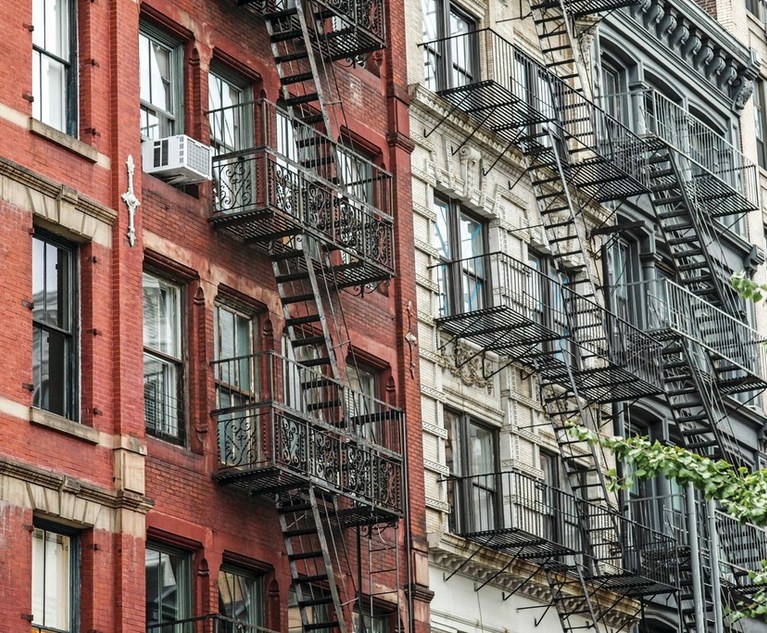ERAP and Its Impact on Landlord-Tenant Litigation
Since its inception, ERAP has put a tremendous strain on landlords seeking to have their cases heard on the merits due to the tremendous backlog of cases that are either awaiting determinations from OTDA, or having a motion heard by the court to vacate a stay in effect.
February 06, 2023 at 10:30 AM
19 minute read
 In 2019 the newly elected, left-leaning, State Legislature passed the Housing Stability Tenant Protection Act (HSTPA), which literally turned almost a half-century of landlord and tenant law on its head. This law was clearly designed to help tenants and to make it more difficult for landlords to commence or follow through on any type of eviction proceedings. Notwithstanding the chaos that it created in NYC's Housing Court, which was already struggling with an overwhelming caseload, no one could predict that in March 2020, the entire NYS court system would come to a grinding halt with the onset of the COVID-19 pandemic. In time, as the courts slowly became operational to a degree, the methodology of dealing with cases in every court was permanently altered.
In 2019 the newly elected, left-leaning, State Legislature passed the Housing Stability Tenant Protection Act (HSTPA), which literally turned almost a half-century of landlord and tenant law on its head. This law was clearly designed to help tenants and to make it more difficult for landlords to commence or follow through on any type of eviction proceedings. Notwithstanding the chaos that it created in NYC's Housing Court, which was already struggling with an overwhelming caseload, no one could predict that in March 2020, the entire NYS court system would come to a grinding halt with the onset of the COVID-19 pandemic. In time, as the courts slowly became operational to a degree, the methodology of dealing with cases in every court was permanently altered.
In a new effort to protect tenants from eviction as the world was coping in virtually complete lockdown, the woke Legislature, in its "infinite" wisdom, passed legislation that would indefinitely prevent landlords from either moving forward with matters commenced pre-pandemic or initiating new ones.
On June 30, 2020, the governor signed the Tenant Safety Harbor Act (TSHA) (Chapter 127 of the laws of New York 2020), which provided protection from eviction for renters who had experienced financial hardship during the pandemic. It prohibited courts from evicting residential tenants who experienced financial hardship for nonpayment of rent that occurred or became due during the COVID-19 period. It applied to any unpaid rent accrued between March 7, 2020, and a yet to be determined date when COVID related restrictions would be lifted. The statute did not define the term "hardship". Thereafter on Dec. 28, 2020, the legislature passed a statute known as "CEEFPA" (COVID-19 Emergency Eviction and Foreclosure Protection Act). This statute stayed all pending residential eviction proceedings for 60 days and provided a further stay through May 1, 2021, to those tenants who provided the landlord a hardship declaration declaring they have been negatively impacted as a result of the pandemic. For people experiencing financial hardship and those who were unable to move during this period due to an increased risk of severe illness or death due to COVID-19, this statute also stayed all pending residential procedures for an indefinite period with no recourse for the landlord to contest any cases where a "Covid Hardship Declaration" was presented to the landlord or the state or the court. It further mandated that the landlord provide these forms to every tenant and or household that they rented to, adding yet an additional burden on the landlord. As a result of a tenant's or occupant's ability to "self-declare" his or her hardship without any further documentation, causing all pending or future litigation to cease, an action was brought to challenge CEEFPA's constitutionality, which ultimately ended up in the U.S. Supreme Court.
This content has been archived. It is available through our partners, LexisNexis® and Bloomberg Law.
To view this content, please continue to their sites.
Not a Lexis Subscriber?
Subscribe Now
Not a Bloomberg Law Subscriber?
Subscribe Now
NOT FOR REPRINT
© 2025 ALM Global, LLC, All Rights Reserved. Request academic re-use from www.copyright.com. All other uses, submit a request to [email protected]. For more information visit Asset & Logo Licensing.
You Might Like
View All
Skadden and Steptoe, Defending Amex GBT, Blasts Biden DOJ's Antitrust Lawsuit Over Merger Proposal
4 minute read
Come Fly With Me: DOJ’s Proposed FARA Amendments and the Tourism Industry
10 minute readTrending Stories
- 1South Florida Attorney Charged With Aggravated Battery After Incident in Prime Rib Line
- 2'A Death Sentence for TikTok'?: Litigators and Experts Weigh Impact of Potential Ban on Creators and Data Privacy
- 3Bribery Case Against Former Lt. Gov. Brian Benjamin Is Dropped
- 4‘Extremely Disturbing’: AI Firms Face Class Action by ‘Taskers’ Exposed to Traumatic Content
- 5State Appeals Court Revives BraunHagey Lawsuit Alleging $4.2M Unlawful Wire to China
Who Got The Work
J. Brugh Lower of Gibbons has entered an appearance for industrial equipment supplier Devco Corporation in a pending trademark infringement lawsuit. The suit, accusing the defendant of selling knock-off Graco products, was filed Dec. 18 in New Jersey District Court by Rivkin Radler on behalf of Graco Inc. and Graco Minnesota. The case, assigned to U.S. District Judge Zahid N. Quraishi, is 3:24-cv-11294, Graco Inc. et al v. Devco Corporation.
Who Got The Work
Rebecca Maller-Stein and Kent A. Yalowitz of Arnold & Porter Kaye Scholer have entered their appearances for Hanaco Venture Capital and its executives, Lior Prosor and David Frankel, in a pending securities lawsuit. The action, filed on Dec. 24 in New York Southern District Court by Zell, Aron & Co. on behalf of Goldeneye Advisors, accuses the defendants of negligently and fraudulently managing the plaintiff's $1 million investment. The case, assigned to U.S. District Judge Vernon S. Broderick, is 1:24-cv-09918, Goldeneye Advisors, LLC v. Hanaco Venture Capital, Ltd. et al.
Who Got The Work
Attorneys from A&O Shearman has stepped in as defense counsel for Toronto-Dominion Bank and other defendants in a pending securities class action. The suit, filed Dec. 11 in New York Southern District Court by Bleichmar Fonti & Auld, accuses the defendants of concealing the bank's 'pervasive' deficiencies in regards to its compliance with the Bank Secrecy Act and the quality of its anti-money laundering controls. The case, assigned to U.S. District Judge Arun Subramanian, is 1:24-cv-09445, Gonzalez v. The Toronto-Dominion Bank et al.
Who Got The Work
Crown Castle International, a Pennsylvania company providing shared communications infrastructure, has turned to Luke D. Wolf of Gordon Rees Scully Mansukhani to fend off a pending breach-of-contract lawsuit. The court action, filed Nov. 25 in Michigan Eastern District Court by Hooper Hathaway PC on behalf of The Town Residences LLC, accuses Crown Castle of failing to transfer approximately $30,000 in utility payments from T-Mobile in breach of a roof-top lease and assignment agreement. The case, assigned to U.S. District Judge Susan K. Declercq, is 2:24-cv-13131, The Town Residences LLC v. T-Mobile US, Inc. et al.
Who Got The Work
Wilfred P. Coronato and Daniel M. Schwartz of McCarter & English have stepped in as defense counsel to Electrolux Home Products Inc. in a pending product liability lawsuit. The court action, filed Nov. 26 in New York Eastern District Court by Poulos Lopiccolo PC and Nagel Rice LLP on behalf of David Stern, alleges that the defendant's refrigerators’ drawers and shelving repeatedly break and fall apart within months after purchase. The case, assigned to U.S. District Judge Joan M. Azrack, is 2:24-cv-08204, Stern v. Electrolux Home Products, Inc.
Featured Firms
Law Offices of Gary Martin Hays & Associates, P.C.
(470) 294-1674
Law Offices of Mark E. Salomone
(857) 444-6468
Smith & Hassler
(713) 739-1250







